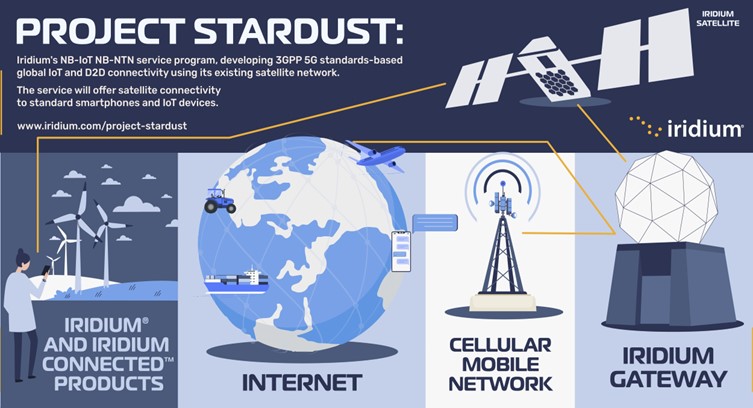Iridium Communications, a leading provider of global voice and data satellite communications, announced Project Stardust, the evolution of its direct-to-device (D2D) strategy with 3GPP 5G standards-based Narrowband-Internet of Things (NB-IoT) Non-Terrestrial Network (NB-NTN) service development.
As a new standards-based solution, it will be deployed on Iridium’s existing satellite network giving the company a unique ability to offer both high-quality proprietary and standardized D2D and IoT services to its customers. Earth orbiting (LEO) satellites offers a special opportunity to smartphone companies, OEMs, chipmakers, mobile network operators (MNO) and related IoT developers to have their requirements woven into the fabric of the Iridium® network. Iridium is already collaborating directly with several of these companies.
Iridium is designing its initial NB-IoT offering to support 5G NTN messaging and SOS capabilities for smartphones, tablets, cars, and related consumer applications. Adopting the service will enable device manufacturers to add a satellite connection to standardized devices, take advantage of existing, globally allocated and coordinated Iridium spectrum, and provide a superior low-latency LEO user experience. The Iridium network supports approximately 1,300 SOS and emergency (911 or equivalent) incidents per year, around the world and has readily available systems, processes, and partners to implement this capability for new devices.
Iridium understands the market need for its customers to develop and certify products quickly. Applying our established onboarding processes, chipmakers and NB-IoT developers can join Iridium’s ecosystem of about 500 partners, and choose a proprietary, standards-based, or dual-solution integration approach for added network redundancy. MNOs will have the opportunity to be a one-stop shop for ubiquitous coverage and off-grid use cases, with unmatched industry reliability. Iridium partners are supported by a 24/7 customer support, back office, billing, and provisioning system, all ready to support the new service upon launch.
The Iridium satellite constellation’s fully crosslinked, LEO architecture and global L-band spectrum provides a competitive service advantage versus other LEO and geostationary satellite networks. Certified to provide safety of life services by international regulatory bodies, the Iridium network has become the gold standard of reliability and continues to be the only network that provides connectivity everywhere on Earth. Operating in LEO, the Iridium constellation does not suffer from the same line-of-sight limitations, significant power requirements or outages that can affect entire regions from a single satellite as faced by geostationary systems.
The recognized leader in satellite IoT and personal communications, Iridium has more than two decades of experience and an unmatched partner ecosystem supporting more than 2.2 million users around the world. As of the third quarter of 2023, Iridium subscribers have grown at a 15% CAGR over the last five years, and the company serves approximately 1.7 million IoT customers today, including about 900,000 personal trackers and satellite messengers for consumer, enterprise, and government applications. Known for its reliability, coverage, and low power requirements, the Iridium network is an ideal fit for NB-IoT NTN service.
The company is currently working with several D2D and IoT-focused companies to understand and incorporate their use cases, requirements, and end-user needs into its planned service. The company anticipates testing to begin in 2025, with service in 2026.
Iridium CEO Matt Desch,
This is an exciting moment for Iridium and is a testament to the flexibility and capability built into our satellite constellation. The industry is moving quickly towards a more standards-based approach, and after surveying the field, we found that we’re the best positioned to lead the way using our own network, particularly given our true global coverage.






















